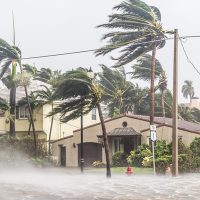Four Ways That Hurricanes Are Different Than Other Property Damage Claims

Hurricane season is here in Florida and it looks to be an active one. Property damages in Daytona Beach due to passing storms are always a concern. While your homeowner’s insurance coverage provides protection, you need to be aware of the ways in which hurricane damages differ from other types of claims.
Protect Yourself Against Hurricane Damages By Knowing What Is Covered By Your Property Damage Policy
Hurricane forecasters are predicting an active 2021 season, with the first-named hurricane already making an appearance. In early July, the Daytona News-Journal reported on hurricane Elsa, which was downgraded to a tropical storm as it passed over the Florida Keys after wreaking havoc in parts of the Caribbean. More than a dozen other storms are predicted between now and November, with several of them expected to be on the larger side.
For property owners in Daytona Beach, it is important to take precautions now to protect yourself and your property, which includes being familiar with what is covered by your homeowner’s insurance policy. Kiplinger advises that hurricanes are typically handled differently than other types of claims. The following are four ways this could impact your rights to compensation:
- Flooding is not covered. Many Floridians have dealt firsthand with the frustration of being denied coverage for flood damage to their homes in the aftermath of a hurricane or tropical storm. To ensure you are protected, check the terms of your policy and flood maps for the area. Coverage available through the National Flood Insurance Program may be an option.
- Hurricane damage often has a higher deductible. In addition to not covering hurricane-related flooding, insurers often charge a higher deductible for hurricane damages to your home or other property. In some cases, hurricane damages may be covered by an entirely different policy or a special rider. Again, review all policy-related documents to ensure you are prepared.
- There are special provisions regarding fallen trees. Some of the most considerable damages due to tropical storms and hurricanes are done by falling trees. While your policy may cover the costs of damages to your home or property, it may not cover damages from one of your trees to a neighbor’s home, opening you up to liability issues. If a tree falls but does not cause any actual damages, property damage policy provisions could leave you paying out of pocket for the cleanup costs.
- There are often state and federal programs that can help offset losses. When a major hurricane impacts our area and insurance policies you have in place fail to cover your costs, state and federal programs may be available to help make up the difference.
Let Us Help You Today
At Bundza & Rodriguez, we are dedicated to helping you get the maximum amount you need to recover from hurricane damages. Before making any statements to insurers or accepting any settlements, contact our Daytona Beach residential & commercial property damage attorneys and request a consultation first.
Source:
news-journalonline.com/story/news/2021/07/03/elsa-downgraded-tropical-storm-could-hit-volusia-flagler-tuesday/7852094002/

